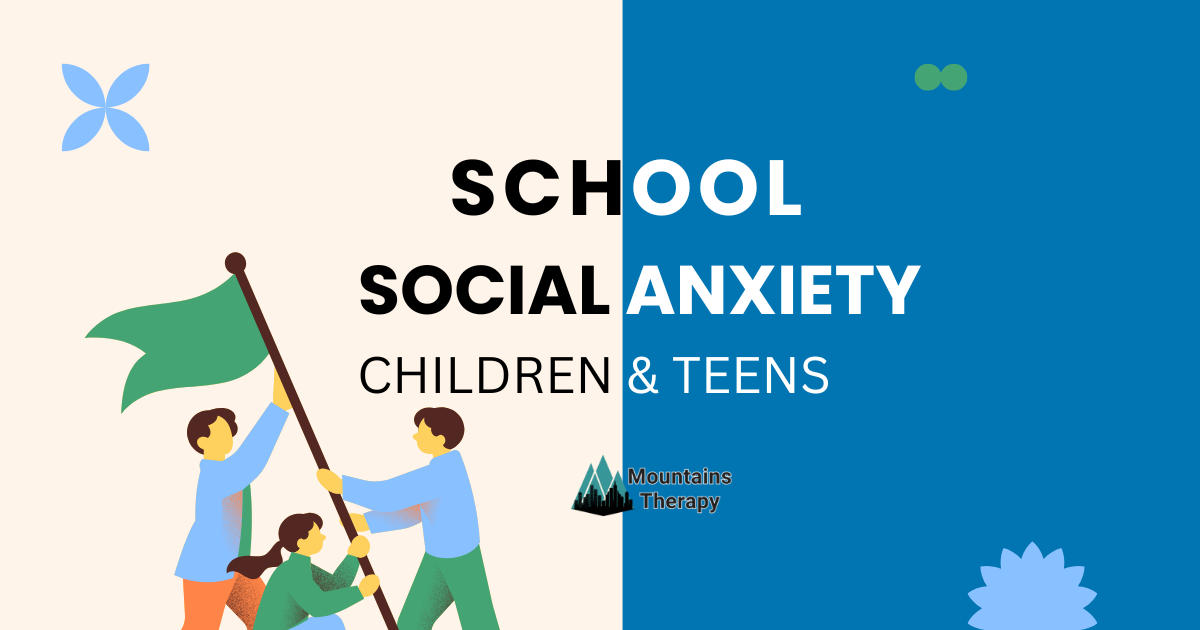Going Back to School With Social Anxiety: How TO Help Kids & Teens
Learn more about Child & Teen Therapy in NJ.
In This Blog, You’ll Learn
✅ What social anxiety is in children and teens
✅ How school and social media can make anxiety worse
✅ Signs your child may have social anxiety
✅ Myths vs. facts about social anxiety in kids and teens
✅ Coping strategies for school-related anxiety
✅ The most effective therapies for social anxiety
✅ How Mountains Therapy in Montclair, NJ can help kids 6+ and teens
What is Social Anxiety in Kids and Teens?
Social anxiety is more than just shyness. It’s a type of anxiety disorder that causes intense fear of social situations, especially where a child feels they might be judged, embarrassed, or rejected. For students, this might mean feeling overwhelmed in class discussions, avoiding group projects, or worrying for days before a presentation. With today’s online pressures, social media can also amplify fears of being judged or compared to peers. At Mountains Therapy in Montclair, NJ, we provide therapy for children ages 6 and up and teens, helping them gain confidence, reduce anxiety, and succeed socially and academically.
Signs Your Child or Teen May Have Social Anxiety
Social anxiety isn’t just shyness. It’s an intense, persistent fear of social or performance situations that can affect your child’s school life, friendships, and confidence. Kids and teens may not always have the words to explain their feelings, so parents should watch for:
At School
- Extreme nervousness before going to school or social events
- Avoiding raising their hand, joining group work, or speaking in front of classmates
- Avoiding class participation, group work, or making new friends
- Refusing to go to school or often saying they feel sick on school mornings
- Dreading presentations, group projects, or participating in extracurricular activities
- Sitting alone at lunch or recess instead of joining peers
- Becoming upset or irritable before school or after social events
- Avoiding school altogether due to anxiety
With Friends & Peers
- Hesitation to make new friends or join activities they once enjoyed
- Avoiding birthday parties, dances, or team sports due to fear of embarrassment
- Constantly replaying conversations in their head, worrying they “said something wrong”
- Over-relying on one or two friends to avoid meeting new people
At Home
- Meltdowns or tears the night before school or social events
- Struggling to explain why they feel anxious, saying “I just don’t want to go”
- Becoming irritable or withdrawn when social plans are mentioned
With Social Media
- Avoiding posting photos or videos for fear of criticism
- Spending excessive time editing posts or overthinking messages before sending
- Comparing themselves to others online, which lowers self-esteem
- Feeling anxious after seeing classmates’ posts about events they weren’t invited to
Emotional & Physical Signs
- Racing heartbeat, stomachaches, headaches, or sweaty palms before/during social situations
- Shaky voice or trouble speaking when called on in class
- Avoiding eye contact and giving short responses when speaking to others
- Feeling drained after social activities, even when nothing went wrong
Myths vs. Facts About Social Anxiety in Kids & Teens
Myth: Social anxiety is just being shy.
Fact: Social anxiety is a recognized mental health condition that can interfere with learning, friendships, and emotional growth.
Myth: Kids will “grow out of it” without help.
Fact: Without support, social anxiety can persist into adulthood. Early therapy helps kids develop lifelong coping skills.
Myth: Social media always helps kids connect.
Fact: While it can be a tool for connection, social media often increases comparison, fear of missing out (FOMO), and anxiety, especially during back-to-school season.
Myth: Pushing kids into social situations will make them less anxious.
Fact: Gradual, supported exposure with a therapist is more effective than forcing situations that may increase fear.
Myth: If a child is doing well academically, they can’t have social anxiety.
Fact: Many socially anxious students excel academically while still struggling with intense fear in social situations.
Myth: Forcing kids into social situations will fix it.
Fact: Gradual, supported exposure with a trained therapist is more effective and less overwhelming.
Myth: Social anxiety means a child doesn’t want friends.
Fact: Many kids with social anxiety deeply want friendships but fear rejection or embarrassment.
How School Can Trigger Social Anxiety
- New Classrooms: Being with unfamiliar classmates can trigger fear of judgment.
- Public Speaking: Oral presentations can cause overwhelming stress.
- Group Projects: Working with peers may feel intimidating.
- Lunchtime: Cafeteria seating can feel like a social minefield.
- Changing Schools: Moving from elementary to middle or high school increases anxiety for some kids.
- Social Media: Online comments, likes, and comparisons can increase self-consciousness.
Coping Strategies for School-Related Social Anxiety
- Practice the 3-3-3 Rule: Name 3 things you see, 3 things you hear, and move 3 parts of your body to stay grounded.
- Prepare and Rehearse: Role-play presentations or conversations at home.
- Challenge Anxious Thoughts: Ask, “What evidence do I have that this fear will come true?”
- Breathe Deeply: Slow, deep breaths can calm the body’s stress response.
- Small Steps: Gradually face fears—start with raising a hand in class, then speaking in a group.
- Limit Social Media Time: Reduce exposure to online triggers and comparison cycles.
How Therapy Helps Kids & Teens with Social Anxiety
At Mountains Therapy, we use evidence-based approaches to help children and teens feel more comfortable in social and school settings:
- CBT (Cognitive Behavioral Therapy) – The most effective treatment for social anxiety, helping kids reframe negative thoughts.
- Exposure Therapy – Gradual, supported exposure to feared situations.
- Mindfulness-Based Therapy – Helps kids focus on the present instead of worrying about what others think.
- ACT (Acceptance Commitment Therapy) – Teaches acceptance of anxious feelings while staying true to personal values.
- Narrative Therapy – Helps kids reframe their identity from “I’m awkward” to “I’m learning to be confident.”
- DBT Skills – Builds emotional regulation and stress tolerance.
Therapy Options for Social Anxiety
- Individual Therapy for Social Anxiety – One-on-one sessions tailored to your child’s needs.
- Family Therapy for Social Anxiety – Helps parents and siblings understand and support the child.
- Online Therapy for Social Anxiety– Available in NJ, NC, FL, and UT for flexible access.
- In-Person Therapy for Social Anxiety – Warm, supportive sessions in Montclair, NJ.
You’re Not Alone! Support for Social Anxiety is Here
Social anxiety can make school feel overwhelming, but with the right support, kids and teens can develop confidence, friendships, and resilience. Book your child’s session today.
Contact us to find the best child social anxiety therapist near me NJ, and the best teen social anxiety therapist near me NJ.
We’re proud to support students going back to local public and private schools, including:
Public Schools (Montclair Public School District):
- Bradford Elementary School (PK–5)
- Northeast Elementary School (K–5)
- Buzz Aldrin Middle School (6–8)
- Charles H. Bullock Elementary School (K–5)
- Edgemont Montessori School (K–5)
- Hillside Elementary School (3–5)
- Nishuane Elementary School (PreK–2)
- Watchung Elementary School (K–5)
- Glenfield Middle School (6–8)
- Renaissance at Rand Middle School (6–8)
- Montclair High School (9–12)
Private & Parochial Schools Nearby:
Whether your child is starting 1st grade or navigating their senior year, our therapists offer developmentally appropriate, supportive, and evidence-based care to help them feel confident, regulated, and ready to succeed this school year.














